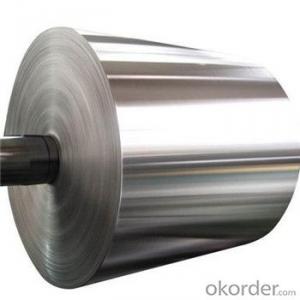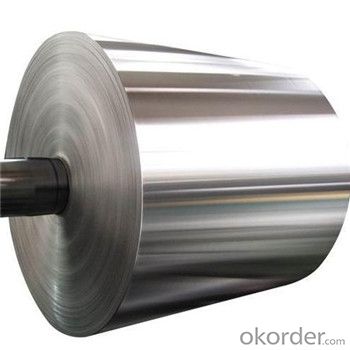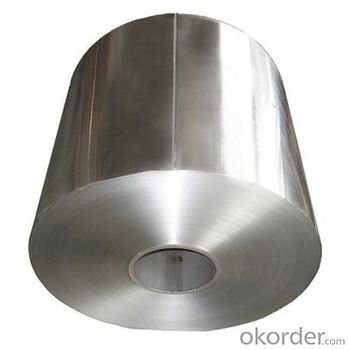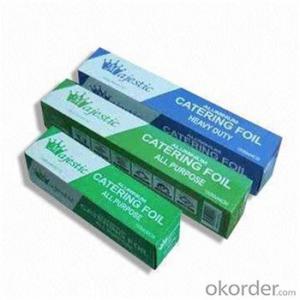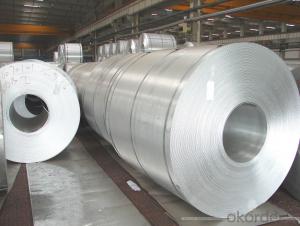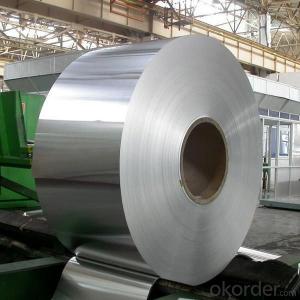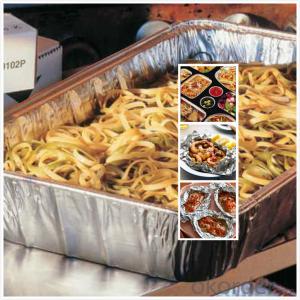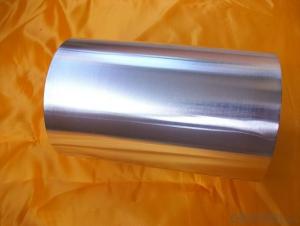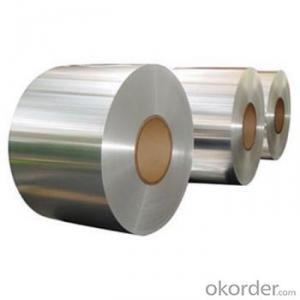Aluminum Coiling Aluminium Household Jumbo Foil for Food Wrapping and Packaging
- Loading Port:
- China main port
- Payment Terms:
- TT OR LC
- Min Order Qty:
- 3 m.t.
- Supply Capability:
- 10000 m.t./month
OKorder Service Pledge
OKorder Financial Service
You Might Also Like
Specification
1. Specification of Aluminium Household Foil Jumbo Foil for Food Wrapping and Packaging
Alloy&Temper: 8011-O
Thickness: 0.009--0.03mm
Width:200mm--1500mm
ID: 76mm, 150mm, 152mm
MOQ: 3 TONS
2. Feature of Aluminium Household Foil Jumbo Foil for Food Wrapping and Packaging
Household foil is available in a variety of formats. In addition to a range of widths and lengths there are textured versions and ready-cut sheets, making it easy to use without unreeling and tearing. ‘Non-stick’ foil can solve many problems, such as baked-on food. Another special foil is black on one side, which transfers radiant heat more efficiently from the black side, making it ideal for roasting.
Most households are used to having aluminium foil in the home. It has become an essential part of modern household convenience – for cooking, reducing cleaning chores in the kitchen and for its many uses around the home, garden or workshop. In commercial kitchens too – restaurants, canteens, schools and hospitals, etc.
3. Certificate:
SGS and ROHS(if client request, paid by client), MTC(plant provided), Certificate of Origin(FORM A, FORM E, CO), Bureau Veritas and SGS (if client request, paid by client), CIQS certificate
4. Image of Aluminium Household Foil Jumbo Foil for Food Wrapping and Packaging
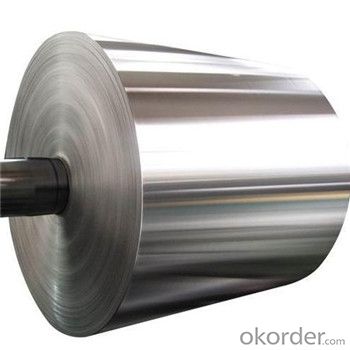
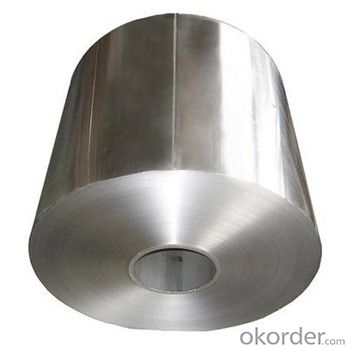
5. Package and shipping of Aluminium Household Foil Jumbo Foil for Food Wrapping and Packaging
eye to sky
eye to wall
with wooden pallet (wooden case also available)
6. FAQ
1) What is the delivery time?
Dpends on actual order, around 20 days
2) What is the QC system:
We have QC staff of 20 persons and advanced equipment, each production is with MTC traced from Aluminum ingot lot.
3) What market do you mainly sell to?
Australia, America, Asia, Middle East, Western Europe, Africa etc
- Q: I want to separate the copper and aluminum so I will get more at the scrap yard for my radiators any one know of an easy way to do this? Thanks
- Does your scrapyard not have a good price for aluminum/copper radiators? Mine does. I Don't think you can separate them short of melting off the aluminum. The copper goes right through it. It would be a lot of work to separate them. Much more work than stripping copper wire. Before I take a load of scrap, I call all of the yards and get the best price. Sometimes this varies as much as $.50/pound on copper and radiators and brass and clean aluminum. Work with your phone, it will make you money. Last I checked, #1 copper 3.10/pound #2: 2.90, Radiators $1.50, Brass $1.40, Insulated copper wire $1.10 to $.90 Aluminum $.85 to $.55 dependingScrap Metal(steel). $9.00/100 Lets recycle Car batteries are $6 ea.
- Q: This question asks for a comparison between aluminum coil and aluminum foil, highlighting their differences.
- <p>Aluminum coil and aluminum foil are both made from aluminum but differ in form and usage. Aluminum coil is a long, continuous roll of aluminum that is typically thicker and more rigid than foil. It is used in various applications such as construction, manufacturing, and packaging due to its strength and durability. Aluminum foil, on the other hand, is a thin, flexible sheet of aluminum that is often used for food packaging, cooking, and insulation. It is lighter and more delicate than coil, making it unsuitable for heavy-duty applications. The primary distinction lies in their thickness, strength, and versatility across different industries.</p>
- Q: What is a better deal?Aluminum Cookware ( Paula Deen)orHard Anodized ( Rachael Ray )
- NEITHER ONE ---------THE BEST COOKWARE IS MADE WITH 14 / 10 STAINLESS STEEL AND WHATEVER BRAND YOU BUY ------MAKE SURE THEY HAVE A ALUMINUM SLUG IN THE BASE FOR EVEN HEATING . THE BRAND I BOUGHT WAS COMMAND PERFORMANCE SOLD ON H.S.N. -----THEY HAVE TEMPERED GLASS LIDS AND 24 KT GOLD PLATED HANDLES ----WORK GREAT AND LOOK GREAT ON DISPLAY .
- Q: How are aluminum coils tested for surface roughness?
- Aluminum coils are tested for surface roughness through various methods, including visual inspection, mechanical profiling, and non-destructive testing techniques. Visual inspection involves examining the surface with the naked eye to identify any visible roughness or irregularities. Mechanical profiling employs instruments like profilometers to measure the surface roughness parameters, such as Ra (average roughness) or Rz (mean peak-to-valley height). Non-destructive testing methods, like ultrasonic or eddy current testing, can also be utilized to detect surface irregularities without causing any damage to the coil. These tests ensure that the aluminum coils meet the required surface roughness specifications for their intended applications.
- Q: Are there any limitations to the maximum coil diameter of aluminum coils?
- There exist limitations on the maximum coil diameter of aluminum coils. Factors such as the type and thickness of the aluminum, the coiling equipment, and the intended application of the coil determine the maximum coil diameter. Thinner and more ductile aluminum alloys generally allow for larger coil diameters. However, maintaining the structural integrity of the coil and preventing deformation, wrinkling, or damage during handling and transportation becomes increasingly challenging as the coil diameter increases. Moreover, the coiling equipment may have its own restrictions on the maximum diameter it can handle. Hence, it is crucial to take these factors into consideration when determining the maximum coil diameter for aluminum coils.
- Q: What are the insulation options available for aluminum coils?
- Depending on the specific requirements and applications, there are various insulation options available for aluminum coils. Some commonly used insulation options include: 1. Foam Insulation: Aluminum coils are often insulated with foam, which provides excellent thermal insulation properties. Foam insulation comes in different forms, such as rigid foam boards or flexible foam sheets, and can be easily cut and fitted around the coils. 2. Fiberglass Insulation: Another popular choice for aluminum coil insulation is fiberglass. It consists of thin glass fibers woven together to create a blanket-like material. Fiberglass insulation is lightweight, easy to install, and offers good thermal and acoustic insulation. 3. Mineral Wool Insulation: Mineral wool insulation is made from natural or synthetic minerals that are melted and spun into fine fibers. It is known for its excellent fire-resistance properties and provides effective thermal insulation for aluminum coils. 4. Reflective Insulation: To reflect radiant heat away from the aluminum coils, reflective insulation is used. It typically consists of a layer of aluminum foil laminated to a layer of fiberglass or plastic bubble wrap. Reflective insulation is particularly effective in warmer climates where reducing heat gain is a priority. 5. Vapor Barrier Insulation: Vapor barrier insulation is applied to prevent moisture transfer through the insulation material. It is often used as a coating or film over the insulation, creating a barrier against water vapor and reducing the risk of condensation buildup on the aluminum coils. When selecting the appropriate insulation option for aluminum coils, it is important to consider factors such as thermal conductivity, fire resistance, moisture resistance, and installation requirements. Consulting with a professional or referring to manufacturer guidelines can help determine the most suitable insulation option for specific coil applications.
- Q: This question asks about the applications of aluminum coil in the field of architecture.
- <p>Aluminum coil is widely used in architecture for various purposes. It is utilized in the manufacturing of aluminum composite panels, which are lightweight, durable, and have excellent weather resistance, making them ideal for facades and exterior cladding. Aluminum coil is also used in the production of roofing materials and rainwater systems due to its corrosion resistance and strength. In addition, it is employed in the creation of window frames and doors for its thermal insulation properties and aesthetic appeal. Furthermore, aluminum coil is used in the construction of structural components such as beams and columns, taking advantage of its high strength-to-weight ratio and recyclability. Its versatility and sustainability make aluminum coil a popular choice in modern architectural design.</p>
- Q: This question asks about the differences between 3D printed aluminum coils and traditionally manufactured aluminum coils.
- <p>Yes, there are differences between 3D printed and regular aluminum coils. 3D printed aluminum coils are manufactured using additive manufacturing, which allows for complex geometries and customization. They can be produced with less material waste and can be designed for specific applications. Traditionally manufactured aluminum coils, on the other hand, are typically made through processes like rolling, which may not offer the same level of design flexibility. 3D printed coils may have different mechanical properties due to the layer-by-layer manufacturing process, potentially resulting in varying strength and durability. Additionally, 3D printed coils might have a higher cost due to the specialized equipment and materials required for additive manufacturing.</p>
- Q: does anyone know any ANTI-PERSPIRANTS that don't have any harmful chemicals such as aluminum chloride? I need something that makes you not sweat but I don't want bad chemicals in it!
- Antiperspirant Without Aluminum
- Q: This question asks for the cost of a set of aluminum coils.
- <p>The cost of a set of aluminum coils can vary significantly based on factors such as the current market price of aluminum, the size and thickness of the coils, and the quantity being purchased. As of my last update, the price of aluminum fluctuates with the global commodities market, and it's best to check with suppliers or on metal exchange platforms for the most accurate and up-to-date pricing. For specific projects, you might need to contact aluminum suppliers directly to get a quote tailored to your requirements.</p>
Send your message to us
Aluminum Coiling Aluminium Household Jumbo Foil for Food Wrapping and Packaging
- Loading Port:
- China main port
- Payment Terms:
- TT OR LC
- Min Order Qty:
- 3 m.t.
- Supply Capability:
- 10000 m.t./month
OKorder Service Pledge
OKorder Financial Service
Similar products
Hot products
Hot Searches
Related keywords
